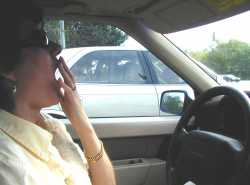
— While self-driving cars creep closer to a reality on American roads, new research from Stanford University says anyone sitting in the "driver" seat will be better off distracted. You know, those distractions all of us are supposed to stay away from when we're driving?
Considering whoever is sitting in the driver's seat in a self-driving car will really just be a passenger, that passenger will need to stay alert in case the self-driving technology goes haywire and tries to send the car over a cliff.
Stanford researchers put test subjects behind the wheel in a simulated self-driving car to determine what would happen if the person would need to quickly take control of the car. The results showed how easily a driver doing nothing could become tired and nod off, not a good thing if the driverless software decides to take a holiday.
Researchers estimate a person needs to respond in less than five seconds if a problem occurs in self-driving mode, yet out of 49 test subjects, 13 fell asleep while babysitting the car. However, only three subjects started to fall asleep when told to read something or watch a video while the car was driving itself.
Everything comes down to a false sense of security with any technology that steps in to assist or take control from a driver. It seems contradictory that a self-driving car needs a driver to always make sure the car is working correctly. But software glitches do occur and for that to occur while traveling 70 mph could be disastrous.
Safety regulators are concerned about drivers putting too much trust in self-driving technology, yet if the technology can't be trusted, what's the point? Would a person be better served taking a bus if they don't want the responsibility of driving?
Researchers have already noticed during testing that people in self-driving cars will quickly take their attention off anything related to driving, believing a self-driving car will do what it was designed to do. Yet researchers say this is a serious mistake because the technology could fail at any time.
The more advances in vehicle technology the more drivers will need to learn, not unlike an airline pilot flying on autopilot. A "driver" in a self-driving car will need to constantly be on alert for warning lights and sounds used to indicate problems in self-driving mode. Those warnings could signal a driver based on different human senses.
For example, lights, vibrating seats and audible voice alarms could be used separately or in combination. Unless a driver has specific training such as received by airline pilots, all kinds of alarms going off could cause only confusion to a driver.
Google, the leading company with the goal of self-driving cars, believes a human will only make a car less safe, so much so the first Google self-driving test cars were built without steering wheels or pedals.
Although the first road-ready self-driving cars for consumers may not be that drastic, it's possible a steering wheel could have a viewing screen to keep "drivers" entertained and distracted enough to stay awake.




